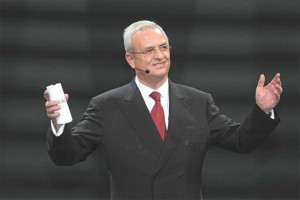
VW CEO Martin Winterkorn wants the maker to be more than the sales leader worldwide. He wants it to the technological leader too.
Already aiming to take the lead in global sales, Volkswagen AG also wants to be the industry’s technology leader, CEO Martin Winterkorn declared during a Geneva Motor Show news conference, and he says the company is ready to back that up with hard cash.
VW invested €11.5 billion, or nearly $13 billion in its “Future Tracks” program last year, a pace of research and development that it apparently has no plans to slow down. The maker is offering up a number of examples of where that money went this week during a series of product debuts at the annual Geneva show from each of its more than a dozen different brands.
“Volkswagen is an innovation think tank,” proclaimed Winterkorn during a Monday night news conference ahead of the opening of the Geneva show. “We develop technologies that point the way well into the future.”
Volkswagen is by no means the only automaker ramping up its R&D spending. The industry, as a whole is investing heavily to meet both government mandates and consumer demands, analysts note. And key rivals, such as Toyota Motor Co. and General Motors, are also pushing to be technology leaders.
Some of the biggest investments are going into regulatory technologies meant to reduce emissions, improve fuel economy and enhance vehicle safety.
One example of German maker’s techno-push is the VW Sport Coupe Concept GTE making its debut at Geneva’s PALExpo convention center. The coupe-like sedan is powered by a plug-in hybrid drive system that pairs a 3.0-liter V-6 with two electric motors. The system creates a virtual all-wheel-drive system using one of those motors to drive the rear axle. In the European test cycle, the Concept gets a 118 mpg fuel economy rating.
But the Sport Coupe Concept also explores new ways to link man and machine. A biometric monitoring system can be used, among other things, to sense the driver’s mood and offer up appropriate suggestions as to which of many different routes to take when an address is entered into the vehicle’s navigation system.
(VW Passat captures Euro Car of the Year. For more, Click Here.)
In all, VW reports it now has 46,000 employees in R&D not including another 10,000 focused specifically on IT.
It’s expected that the automobile will be dramatically transformed by technology in the years ahead. That’s a position that Ford CEO Mark Fields also stressed in a keynote speech at the Consumer Electronics Show earlier this year. Fields said Ford is positioning itself as a mobility company, more than just a manufacturer of automobiles.
(Click Here for details about VW’s new Sport Coupe Concept GTE in Geneva.)
Traditional automakers aren’t the only ones who see opportunities in the ongoing tech revolution, however. The industry has seen a flood of new competitors, such as battery-car start-up Tesla Motors, and Google, the Silicon Valley giant that is pushing to take a lead in the development of autonomous vehicle technology. And even Apple is said to be working on its own self-driving technology.
“It may come as a surprise for you, but I highly welcome the interest of Apple, Google and others in the automobile,” said Winterkorn, “because that means, the car will gain more acceptance from ‘Digital Natives.'”
(To see more about the newly updated and muscled up Audi R8, Click Here.)
The technological revolution does have its downside. The latest J.D. Power Vehicle Dependability Study released last week showed that problems with onboard electronics, such as Bluetooth and navigation systems, pose some of the biggest issues consumers face with their vehicles. But the study also stressed that consumers want makers to offer them even more technology in tomorrow’s vehicles. And if a shopper can’t find what they want on a favorite brand they are likely to look somewhere else.

VW sometimes live is an isolated world when it comes to the auto industry and the future. They do push the tech envelop and come up with some good products, but they are not alone.
Technology has certainly enhanced our lives but it comes with a cost and responsibilities. Anyone who has ever experienced cable TV or phone issues can tell you that the service end of the tech leaves a lot to be desired. The same applies to auto tech where reliability and functionality of the tech can be totally unacceptable.